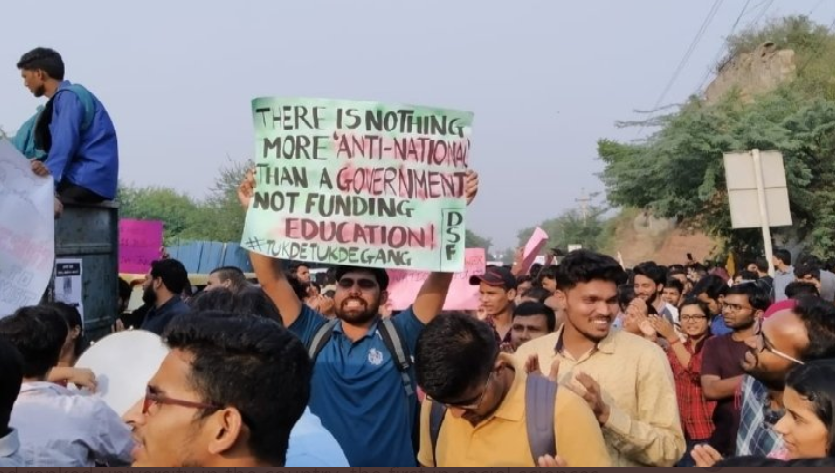How India is being pushed towards commercialization of higher education
The reluctance of the present dispensation in pushing the higher education towards commercialization is not just limited to the fees hike in Jawaharlal Nehru University (JNU). It seems the government is gradually implementing a plan which is not merely confined in reducing subsidies but to convert the entire education system into a business enterprise.

Commercialization of higher education in India is no more a slogan or intellectual debate. There are a number of decisions taken by the Government of India in recent years which indicate a desperate move for commercialization of higher education in the country. Besides, the proposed National Education Policy (NEP) also has several measures to give a huge momentum to the privatization and commercialization in all forms of education. The major visible decisions of the government for commercialization of education could be summarized as under:
Fee Hike
The government is gradually withdrawing hands from subsidized education and pushing the institutes to earn more and bear their expenses through fee hikes and also find out alternate sources for revenue generation. However, the main emphasis is still on increasing the fees as this has become a direct way to increase revenue. The hikes in the hostel fees of the prestigious Jawaharlal Nehru University (JNU) by about 300 percent on the name of ‘utility and service’ charges came into limelight due to students’ protest (JNU Protest), several prestigious institutions succeeded in implementing or are in the process of fees hike without any resistance like JNU (#JNUProtests). The exorbitant fees hike in some more prestigious institutes are as under:
- All India Institute of Medical Sciences (AIIMS) has been asked to hike its fees by about 10 times.
- The fee for MTech programmes in Indian Institutes of Technology has been increased by ten times (900 percent). If the hike is implemented, the students will have to pay up to Rs 2 lakh per annum as tuition fee. Protesting against the fee hike, the students in IIT BHU recently refused to accept degrees from Union HRD Minister Mr. Ramesh P. Nishank.
- Students of Ayurveda in Uttarakhand protesting against 170 percent fees hike in the fees of Ayurvedic Colleges in the state.
- Maulana Azad Urdu National University (MANUU) is also witnessing students protest due to hike in hostel fees.
- In August, the fees for board examination of CBSE were doubled for general category students and hiked by 24 times for SC/ST students.
Education as a tool for US $ 5 trillion Economy by 2024
Though the term commercialization is not being used, the policy makers have coined terms like globalization and inter-nationalization to achieve their targets. Dinesh Patnaik, Additional Secretary, Ministry of External Affairs, in a program of the Confederation of Indian Industry (CII) on November 14 said, “We need to look at internationalization of education holistically. It does not only mean sending Indian students abroad but also welcoming foreign students in India”. The private universities are also promoting and advocating to open education sector for private investment which, according to them, will help in achieving the goal of US $ 5 trillion target for India. Besides, the think tanks close to the public policy makers are also pushing commercialisation of education from school to university level.
International Agreements
The Government of India seems to be in agreement signing campaign with foreign countries apparently with a view to allow them to open campuses in the India and enable Indian universities to open campuses in those countries. Most recently, a Memorandum of Understanding (MoU) was signed with Vietnam on Monday (November 26) for cooperation in education sector. Last week, Australia’s education minister Mr. Dan Tehan made a three days’ visit to India and discussed possibilities for cooperation in education sector with his Indian counterpart Mr. Ramesh P. Nishank. Speaking to media, Tehan revealed his willingness for a France like agreement with India. He also informed that the aim for his visit was to explore opportunities for setting up offshore campuses in India. On November, 1 India signed agreement with Germany for cooperation in skill development and vocational education. The agreement with France was signed on April 29 this year for mutual recognition of selected degrees.
National Education Policy 2019
The Draft National Education Policy (Draft NEP 2019) has several provisions which will push entire education system from pre-school to the university level towards commercialization. The provisions like including pre-school into formal schooling, private education boards at school level, facilities for private universities, autonomy to universities and colleges on the basis of their financial strength are a few provisions which will facilitate commercialisation of education. The policy also aims to allow foreign universities to open campuses in India and Indian universities/ institutions to open campuses in select foreign countries. This has been termed as globalisation of education.
Please isit Live Discourse on JNU Protest and Discourse on Subsidized Education for more updates and share your views/opinons.
(Disclaimer: The opinions expressed are the personal views of the author. The facts and opinions appearing in the article do not reflect the views of Devdiscourse and Devdiscourse does not claim any responsibility for the same.)
- FIRST PUBLISHED IN:
- Devdiscourse










